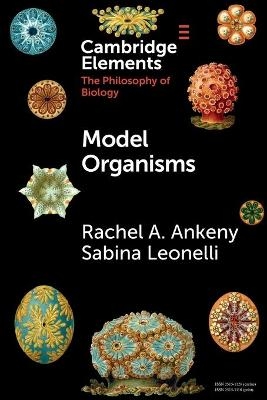
Model Organisms
Seiten
2021
Cambridge University Press (Verlag)
978-1-108-74232-0 (ISBN)
Cambridge University Press (Verlag)
978-1-108-74232-0 (ISBN)
A philosophical exploration of the concept of the 'model organism' in contemporary biology. Thinking about model organisms in order to examine how living organisms have been brought into the laboratory and used to gain a better understanding of biology, and to explore the research practices, commitments, and norms underlying this understanding.
This Element presents a philosophical exploration of the concept of the 'model organism' in contemporary biology. Thinking about model organisms enables us to examine how living organisms have been brought into the laboratory and used to gain a better understanding of biology, and to explore the research practices, commitments, and norms underlying this understanding. We contend that model organisms are key components of a distinctive way of doing research. We focus on what makes model organisms an important type of model, and how the use of these models has shaped biological knowledge, including how model organisms represent, how they are used as tools for intervention, and how the representational commitments linked to their use as models affect the research practices associated with them. This title is available as Open Access on Cambridge Core.
This Element presents a philosophical exploration of the concept of the 'model organism' in contemporary biology. Thinking about model organisms enables us to examine how living organisms have been brought into the laboratory and used to gain a better understanding of biology, and to explore the research practices, commitments, and norms underlying this understanding. We contend that model organisms are key components of a distinctive way of doing research. We focus on what makes model organisms an important type of model, and how the use of these models has shaped biological knowledge, including how model organisms represent, how they are used as tools for intervention, and how the representational commitments linked to their use as models affect the research practices associated with them. This title is available as Open Access on Cambridge Core.
1. Model Organisms; 2. What Do Model Organisms Represent?; 3. How Do Model Organisms Represent?; 4. For Whom Do Model Organisms Represent?; 5. The Model Organism Repertoire; 6. When are Model Organisms 'Good' Representations?; 7. Conclusions: What Future For Model Organisms?.
| Erscheinungsdatum | 20.01.2021 |
|---|---|
| Reihe/Serie | Elements in the Philosophy of Biology |
| Zusatzinfo | Worked examples or Exercises |
| Verlagsort | Cambridge |
| Sprache | englisch |
| Maße | 152 x 230 mm |
| Gewicht | 150 g |
| Themenwelt | Geisteswissenschaften ► Geschichte |
| Geisteswissenschaften ► Philosophie ► Metaphysik / Ontologie | |
| Naturwissenschaften ► Biologie | |
| ISBN-10 | 1-108-74232-7 / 1108742327 |
| ISBN-13 | 978-1-108-74232-0 / 9781108742320 |
| Zustand | Neuware |
| Haben Sie eine Frage zum Produkt? |
Mehr entdecken
aus dem Bereich
aus dem Bereich
Buch | Hardcover (2024)
Matthes & Seitz (Verlag)
CHF 41,90
Über konstruktivistisches Denken in der Theologie
Buch | Softcover (2024)
Verlag Herder
CHF 79,95


